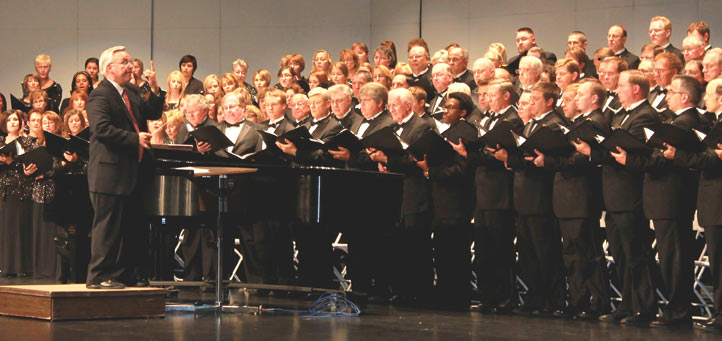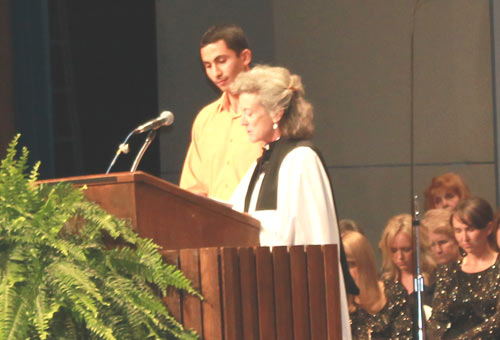After 9/11—‘We come together in grief, to mourn what we lost’
September 16th, 2011 Posted in Arts and LifeStory & Photos by Heidi Hansen
LOGAN—Packing the room with the same spirit of unity initially felt after the Sept. 11, 2001, terrorist attacks, members of various faiths in Cache Valley gathered in the Kent Concert Hall Sunday for a commemoration program featuring prayer, music and words of unity.
 Hosted by Cache Community Connections, an inter-faith organization started in the midst of desperate grief over 9/11, the 10-year anniversary program honored the victims of that fateful day and celebrated the achievements of CCC over the last decade.
Hosted by Cache Community Connections, an inter-faith organization started in the midst of desperate grief over 9/11, the 10-year anniversary program honored the victims of that fateful day and celebrated the achievements of CCC over the last decade.
With a tone of reverence, Muslim graduate student Adel Abdullah opened the program, reciting a prayer from the Qur’an in Arabic. The prayer was then translated into English by the Rev. Susan W. Springer of St. John’s Episcopal Church.
Doug Thomas, founding member of CCC and former mayor of Logan, remarked that after 9/11 two concerns came to mind: “We had a responsibility to protect our Muslim brothers in the community… and we saw a need for an interfaith service.”
Springer added, “We saw among the various faiths that there was a climate, not merely for tolerance, but for warm fellowship.
“We came together in grief, to mourn who and what we had lost,” she said, “and in humility, to examine how to live in harmony with each other.”
 Boasting membership from some very divergent religious groups such as the Baha’i, Buddhist and Jewish communities, the Logan Islamic Center, the LDS Church, the Catholic Church, First Presbyterian Church and the Religious Society of Friends (Quakers), the CCC seems to be actively working towards its goal of harmony and understanding among religious groups. Civic groups, like Logan City Council and School District, have also joined.
Boasting membership from some very divergent religious groups such as the Baha’i, Buddhist and Jewish communities, the Logan Islamic Center, the LDS Church, the Catholic Church, First Presbyterian Church and the Religious Society of Friends (Quakers), the CCC seems to be actively working towards its goal of harmony and understanding among religious groups. Civic groups, like Logan City Council and School District, have also joined.
USU history professor Ross Peterson delivered the keynote address, echoing the night’s spirit of unity and focusing on his own observations of 9/11.
“New Yorkers and Aggies had realized our collective vulnerability,” Peterson said, beginning with memories of a trip to New York shortly after the attacks. He recalled looking out at the view from the Empire State building and thinking: “‘Where were you on September 11?’ now has a new ending.”
Transitioning to changes that have occurred in the world over decade since the 911 attacks, Peterson said, “There are things I’ll never understand about the last decade—I’ll never get Harry Potter, I have no feeling towards vampires…”
More seriously, he noted that the world is now connected electronically, air travel will never be the same, and the cost of the 2008 bank bailout parallels the cost spent on both the Afghanistan and Iraq Wars in the last decade.
He also pointed to the creation of the federal Department of Homeland Security, an agency that costs billions of dollars, as a major change, and said that while the United States has avoided another catastrophe, terrorist attacks in Great Britain, Russia, India and Spain should not be forgotten.
“Looking at history, when we accumulated debt, we added taxes also,” Peterson said, pointing out that in the last 10 years most have instead received tax cuts, not higher taxes. “Today, our nation needs to realize that most of us have not been asked to give up much.”
“The legacy of September 11 will be a lasting legacy of debt,” he said.
“As a nation, we have risen from the rubble,” Peterson said. “We should take pride in our achievement.” However, he said, the country is missing the unity felt during the first few months after the attack. This unity, he said, is exemplified by groups like Cache Community Connections.
“This country demands advanced citizenship,” Peterson said. “The voices today are more contentious, nastier and mean spirited, the pundits are not interested in solving problems, their selling controversy.”
“We must find it in ourselves a spirit that allows us to help others,” Peterson said, encouraging the crowd to look beyond the headlines and scare tactics of the mainstream media. “This country will have serious problems as we move forward, take time to work together and solve them.”
Pastor Paul Heins of the First Presbyterian Church used the closing benediction to issue a call for unity one last time, saying, “Tonight we are one.”
Explaining that the word “Amen” means “let it be so,” Heins asked the crowd to join him in a final “Amen.”
And a crowd of Muslims, Christians, Jews, Buddhists, Mormons, Catholics and Lutherans, happily cheered, “Amen.”
TP
Tags: 911, Cache Community Connections, Doug Thompson, Rev. Susan Springer, Ross Peterson

Sorry, comments for this entry are closed at this time.